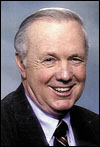 |
 |
Meet the columinist Sample Columns Download Columns Contact Jim |
Herein lies the problem that millions of people face, day-after-day in their personal lives. If you have a problem with money, either personally or in your home, I believe what I'm going to share will be of interest to you. It's my belief that many problems caused by money are due, by in large, by the way money is perceived. First, what is money? Well, money is a form of wealth, but in actuality money is simply a medium of exchange. It's what we use to exchange for goods and services we need and want. In addition to our physical needs, it's a new home, a vacation, a college degree and financial security for our retirement years. We earn money by providing a product or service to other people. When we satisfy their needs and wants, they in turn pay us or reward us with their money. Here's what I meant when I said that most money problems are caused by the way money is perceived. Money, whether currency or coin, is a tangible object. You can see it and touch it. Money is really a "willing servant." It's what we use to serve us and that's really all it is. When we permit it to become more than that, it then becomes an emotional issue and emotion is not tangible. We can't see and touch our emotions. It's like the wind. The money that comes to us from one source or another is what we call income. The money we spend is called expenses and discretionary spending. Do your best to never fall into this trap: money is tangible and you can see it and touch it, you can receive it and you can spend it, but when your money begins to become an emotional issue is when real problems begin. As you may know, the reason most marriages fail is because of money problems, namely debt. If a husband and wife would handle money as a tangible object and know they could not spend more than they jointly earn and would keep money from becoming an emotional issue, then most of their problems could be averted. On a related note, credit cards and quicksand have a lot in common. They will both swallow us alive. Over the years I have been guilty of trying to motivate people to earn more money, and certainly that's important in today's times, but if we would spend more time keeping money in perspective, we would all be happier and a lot of marriages wouldn't wind up in divorce. As someone has said, "It's nice to have money and the things that money can buy, but it's also good to check up once in a while to make sure we haven't lost the things that money can't buy." I'd like to leave you with these words from the Wall Street Journal: "Money is an article which may be used as a universal passport to everywhere except heaven, and as a universal provider of everything except happiness." (EDITOR'S NOTE: Jim Davidson is a motivational speaker and syndicated columnist. You may contact him at 2 Bentley Drive, Conway, AR 72034.)
|
 The English clergyman and author Thomas Fuller (1608-1661) once said, "Money is the best bait to fish for man with." If you should spend the next one hundred years searching for a room large enough to hold all the books that have been written about money and its related topics, you could not find it. In our modern society, money is something we all desire and something we must have to function in our day-to-day lives. The amount of money each of us needs, however, is determined by a wide variety of factors: the lifestyle we choose, where and how we live, government policy, inflation and individual responsibility, just to mention a few. The Bible says that "The love of money is the root of all evil." The Bible is true, but we must take note that it doesn't say that money is the root of all evil, rather it is the love of money.
The English clergyman and author Thomas Fuller (1608-1661) once said, "Money is the best bait to fish for man with." If you should spend the next one hundred years searching for a room large enough to hold all the books that have been written about money and its related topics, you could not find it. In our modern society, money is something we all desire and something we must have to function in our day-to-day lives. The amount of money each of us needs, however, is determined by a wide variety of factors: the lifestyle we choose, where and how we live, government policy, inflation and individual responsibility, just to mention a few. The Bible says that "The love of money is the root of all evil." The Bible is true, but we must take note that it doesn't say that money is the root of all evil, rather it is the love of money.